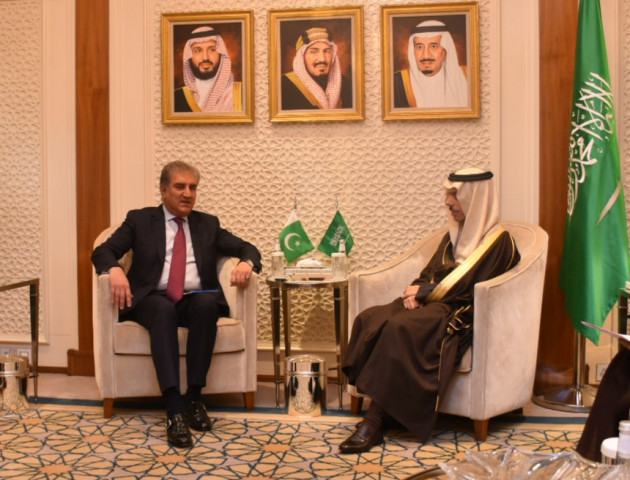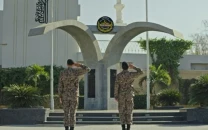Qureshi relays message of ‘restraint’ to Tehran and Riyadh
Foreign minister arrives in Oman following visits to Saudi Arabia and Iran

Qureshi is on a three-nation tour on the direction of Prime Minister Imran Khan against the backdrop of recent escalation in tensions in the region after US assassinated top Iranian general and Tehran retaliated with missiles strikes targeting US military bases in Iraq.
Although threats of an immediate conflict have eased after both Iran and the US sought de-escalation, the situation remains volatile as the US imposed further economic sanctions on Tehran.
The foreign minister arrived in Riyadh from Tehran where he had earlier met the Iranian president as well as his Iranian counterpart and relayed the same message of exercising restraint in the face of the delicate regional situation.
Constructive & positive meeting with H.E President @hassanrouhani. Reiterated effort to deescalate tensions to the President which he supports. We are committed to exercising every diplomatic effort to achieve regional security & are clear Pakistan soil will not be used for war. pic.twitter.com/UOSfAgiWhY
— Shah Mahmood Qureshi (@SMQureshiPTI) January 13, 2020
In Riyadh, Qureshi held wide-ranging talks with Saudi Foreign Minister Prince Faisal bin Farhan Al Saud. A statement issued by the Foreign Office said Qureshi and his Saudi counterpart had “in-depth exchange of views” on recent developments.
“Noting the serious implications for peace and security of recent events, Qureshi stressed the need for all sides to exercise maximum restraint, avoid taking any further escalatory step, work for defusing tensions, and finding ways for constructive engagement,” the statement read.
The foreign minister shared in detail Pakistan’s perspective on the recent developments in the Middle East/Gulf region. He highlighted the thrust of his diplomatic outreach as part of the prime minister’s direction that Pakistan must support all efforts aimed at avoiding conflict and resolving differences and disputes through political and diplomatic means.
Qureshi also apprised his Saudi counterpart of his telephonic conversations with the foreign ministers of the regional countries, and other diplomatic contacts, noting an overwhelming level of support for the efforts for de-escalation.
As “partner for peace”, the foreign minister stated, Pakistan would support all efforts for peace and provide all possible facilitation for constructive engagement among parties.
The Saudi foreign minister welcomed Qureshi’s visit and Pakistan’s support for efforts for defusing tensions, preserving peace and security, and helping find a diplomatic way forward. The two sides agreed to remain engaged and consult closely on issues affecting peace and security in the region and beyond.
The foreign minister thanked for Saudi Arabia’s steadfast support for the Kashmir issue and exchanged views on deepening bilateral cooperation in economic and financial fields.
The foreign minister underscored that the fraternal ties between Pakistan and Saudi Arabia were deep-rooted and multi-faceted and the strategic relationship between the two countries was growing in myriad dimensions.
Prince Faisal reaffirmed the strategic importance of Saudi-Pakistan relations and the resolve to deepen mutual cooperation in all fields.
In the last leg of his visit, Qureshi will now travel to Washington to discuss the recent developments in the Middle East.
Earlier, PM Imran made it abundantly clear that Pakistan would not become party to any war and offered his country’s ‘good offices’ to help defuse tensions in the region.
Pakistan’s diplomatic efforts stemmed from the fact that any war in the region would negatively impact the country. Observers, however, are sceptical if Pakistan has enough leverage and capacity to play a role of mediator to resolve the decades-old complex Middle East situation.
Successive governments have in the past, on different occasions, tried to facilitate dialogue between Iran and Saudi Arabia. Last time such efforts were made when Saudi oil facilities came under missile attacks in September. Riyadh and Washington pointed finger at Iran.
There were fears that either Saudi Arabia or the US might retaliate. Pakistan, sensing the gravity of the situation attempted to lower the temperature with PM Imran undertaking visits to both Iran and Saudi Arabia.
Qureshi at that time had claimed that it was due to Pakistan’s efforts that threat of further escalation in tension was averted. The government thinks that Pakistan must remain engaged with all key players involved in the conflict.
Visit to Oman
Qureshi later left for Oman after completing the day-long visit to Saudi Arabia.
Protocol officer of Saudi Foreign Ministry Abdullah M Rashid and Pakistan’s Ambassador to the Kingdom Raja Ali Ejaz, among other senior officials of the Pakistan Embassy saw the minister off at the King Khalid International Airport.
Foreign Minister Shah Mehmood Qureshi leaves for Oman after completing day-long visit to Saudi Arabia pic.twitter.com/yX0z1IMFdW
— The Express Tribune (@etribune) January 13, 2020
Upon arrival at the Muscat International Airport, Qureshi was received by Pakistan’s Ambassador to Oman Ahsan Wagan and officials of Oman’s Foreign Ministry in wee hours of Tuesday.
Foreign Minister Shah Mehmood Qureshi arrives in Muscat, Oman after visits to Saudi Arabia and Iran pic.twitter.com/sF4LqHQaJR
— The Express Tribune (@etribune) January 13, 2020
He will extend condolences to the royal family over the death of Sultan Qaboos.



















COMMENTS
Comments are moderated and generally will be posted if they are on-topic and not abusive.
For more information, please see our Comments FAQ